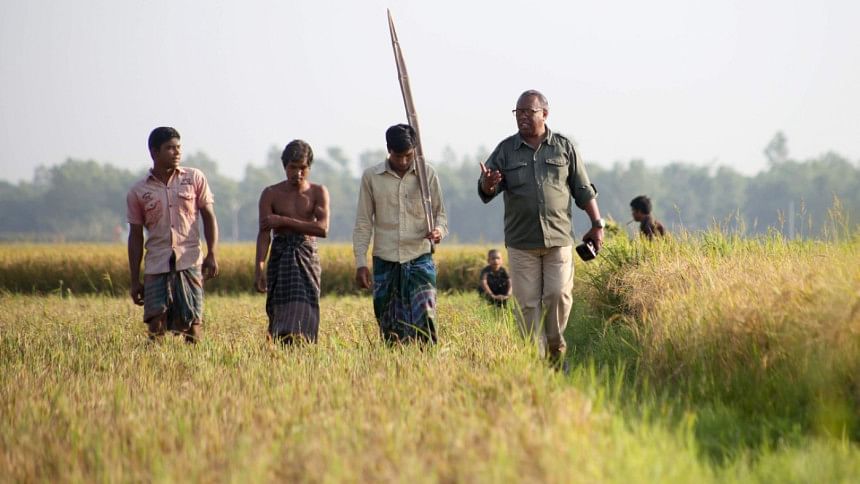Fall in paddy price frustrates growers

The news that broke across the country recently is about a frustrated farmer, Abdul Malek Shikder, who sets his paddy plants ablaze out of frustration of low price in Tangail’s Kalihati upazila. The news has shocked the nation. It is hard to believe that the farmer himself sprayed kerosene on part of his golden field. The prices of paddy have kept falling in the last several months owing to a good harvest in the previous three crop seasons. In the past few weeks, on my verified YouTube channel and Facebook page farmers have commented that they are not getting reasonable price for their produce. I received thousands of messages on messenger and everyone quoting the same low price factor.
Farmers in Kalihati have grown paddy on 18,530 acres of land this year and the harvest is bumper. Farmers across the country have planted paddy on 49.33 lakh hectares of land in the ongoing Boro season, according to the Department of Agricultural Extension (DAE). The cost of growing paddy is more than Tk 500 per maund while the grain is being sold at Tk 500 per maund, according to farmers in Kalihati. They also said that they need over Tk 1,000 to take the harvest home. Most of the farmers are getting half the production cost, counting up to Tk 3,000 in losses in per bigha (33 decimals) land.
Beyond everything else, the fire on the paddy really broke my heart. When Abdul Malek gets only Tk 500 for per maund of paddy, whereas with labour cost and others, he’s paying a lot more than I have said earlier. This is nothing new for the farmers. They earlier destroyed their tomatoes, eggplants and also threw away milk on roads for not getting fair price. We definitely feel the pain for the farmers, but at the end of the day, what do we actually do for them?
During the March-April period this year, at the open field pre-budget, 2019-2020, dialogue session, Krishi Budget, Krishoker Budget, farmers were complaining about the Aman market then and were panicked about the upcoming Boro price. They said they would be finished if the price goes down. That is what actually happened in reality. In front of former Finance Minister Abul Maal Abdul Muhith, a farmer in Natore said, ‘What should I say Sir, the production is great but what will I do with this. There is no price. Not even half the production cost comes return if I sell it at Tk 500 to Tk 550 per maund.’
Farmers are saying, in the past one decade, they never faced such a huge price fall. Farmer Matiur Rahman from Dinajpur’s Birul upazila said one sack (76 kg) of BRRI 28 rice is being sold at Tk 1050 to Tk 1150 whereas per sack production cost is Tk 1300. For the past ten or fifteen days I have been going to the markets and talking to the farmers. The price gap is extreme and the pain of the farmers is increasing every day. Farmer Abu Helal Khan from Mymensingh’s Bowla village in Phulpur upazila, says the price per maund is only Tk 550. The farmer urged the government to procure rice directly from them so that they can get the fair price. Amirul Islam, another farmer from Sunamganj’s Bishambarpur says on his eight bigha land, he cultivated BRRI 28 and BRRI 29 and yielded around 12 maunds. He spent Tk 5000 for one bigha and got only Tk 5500. He was complaining how he will run his family with this petty profit of only Tk 6000 from 12 maunds.
Farmer Bikash Kumar from Netrakona yielded five maunds from each katha of land. He sold the produce at only Tk 480 per maund whereas Bikash says he spent at least 1900 taka for production, harvest threshing etc. I asked the farmers why you are still producing paddy since there is so much loss. They say it’s in our blood and we can’t just leave it. The government’s rice procuring time is pretty long and they say a special syndicate eats the butter and farmers are wasted. Syndicate people spread rumours and buy the paddies at a very low price from the farmers. It’s happening in Barisal, Brahmanbaria, Patuakhali, Rajshahi, Bogura and many other parts of the country. Almost 95 percent of paddy and rice remain beyond government’s procure system and those remain in the open market. And, somehow this open market is so strong to give a fight to the government. And, at the end of the day farmers are losing everything, no money, no profit, no honour.

Bangladesh is self-sufficient in food production, it really feels good and I really feel proud of it. The research team has worked well to propel the sector. Government has provided a lot to ensure farmers move onward. But, if farmers keep on losing in such manner at the market, it will be very difficult for the government to keep on subsidising. On the other hand, why would farmers keep on growing paddies when they are always under the loss factor? We need the solution very fast, first of all to come out of the import dependency and to make sure that we achieve the sustainable development goal in the given period of time. Government must however control the market and save farmers from the intermediaries. If the procurement process starts a bit early farmers can sell their paddies as soon as they harvest as many of them do farming on credit for agro-inputs. For paying back the loan right after harvest they need to sell half of their paddies as they don’t have any preservation facility. On the other hand, if they don’t pay back the Mahajan (moneylender) they can’ start work for the next crop. To cut back the labour cost, mechanised farming is a great option and the government certainly can think deeply about this on how to help the small farmers so that they get proper subsidy and other facilities for agricultural mechanisation.
Dear readers, we must remember many farmers are losing interest in paddy cultivation. If the number of such farmers increases, the area of paddy cultivation will decrease as well. In this regard, there could be a crisis in the staple food production. There will certainly be a threat on food security. Geographically Bangladesh is very ideal for paddy cultivation and traditionally the land of Bengal is rich for this crop. Keeping this heritage crop at the heart of our farming scenario, we need to take forward our farming sector. We must remember we are sons and daughters of farmers and farming is our sole identity.

 For all latest news, follow The Daily Star's Google News channel.
For all latest news, follow The Daily Star's Google News channel. 



Comments